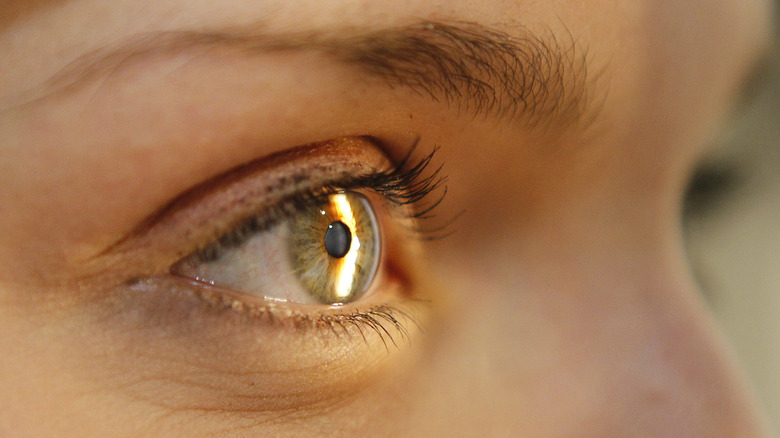The Real Reason Doctors Shine A Light In Your Eye
Every year, we undergo the same physical examination by our doctors. Routine blood testing, weighing, and blood pressure checks are pretty straightforward, but what about some of those stranger parts of the exam? The medical reasons behind knee tapping, pressing on our belly, and the famous open and say "ahhh" might feel a little more mysterious. Shining a light directly into your eye can also be added to this list of mysterious tests. Why does the doctor do this, and what does it reveal about our health and wellness?
Out of all our senses, sight is responsible for 80% of what we learn about the world around us (via Vision Initiative). Our eyes are made up of a variety of large and small parts including the pupil, lens, cornea, iris, and retina. According to the National Eye Institute, light is taken in through the cornea as well as the pupil, while the iris filters how much light enters the eye. When the light is focused on the retina in the back of the eye, it sends messages to the brain, which makes sense of the image in front of us.
Whether performed by a general practitioner or an eye doctor, shining a light in your eye can reveal a great deal about your health.
Your response to the light can indicate other possible health conditions
When shining a light in your eye, doctors are evaluating your eye's response to the light. In healthy eyes, the pupils will maintain their round shape, but should shrink when stimulated by the light (via WebMD). Additionally, the light will allow your doctor to get a better look at the color of your eyes. According to experts at the University of Rochester Medical Center, red eyes may indicate possible irritation or infection, and eyes that are yellow in color can be a symptom of other health conditions, such as liver issues.
Shining a light in your eye through the use of different tools allows an optometrist to further assess your health by looking for any possible blockages in the eye (via Progressive-Glasses.com). Any traces of cloudiness in the eye where it should otherwise appear clear can indicate abnormalities, such as a cataract. This information can be helpful for a doctor in determining a proper course of treatment. Some people experience improvement in their vision following a glasses prescription, while others may require surgery.
Should any problems be detected during the course of the exam, doctors will want to identify any other possible health conditions. WebMD states that an abnormal reaction to the light test could be an indication of diabetes or glaucoma, while the University of Rochester Medical Center suggests nerve communication between the brain and the eye could also potentially be the source of the problem.

